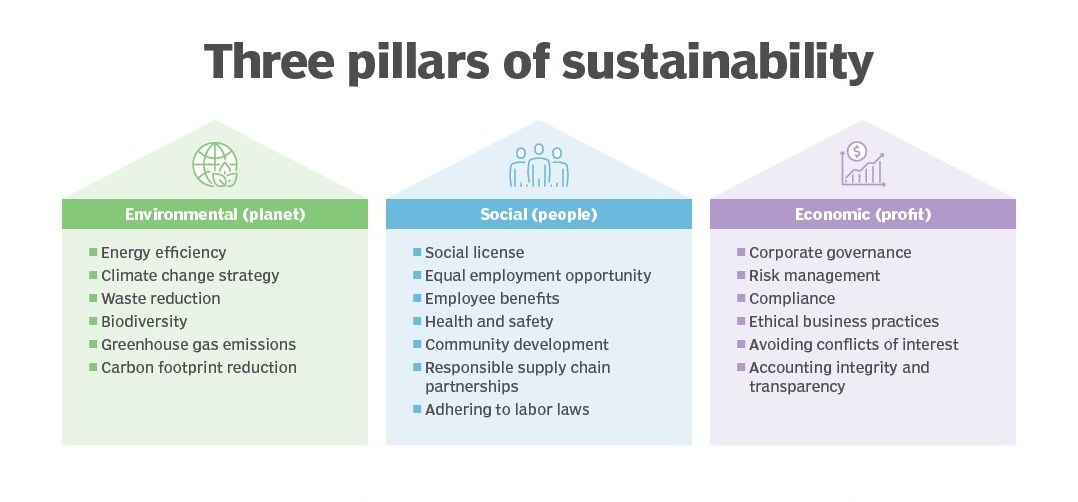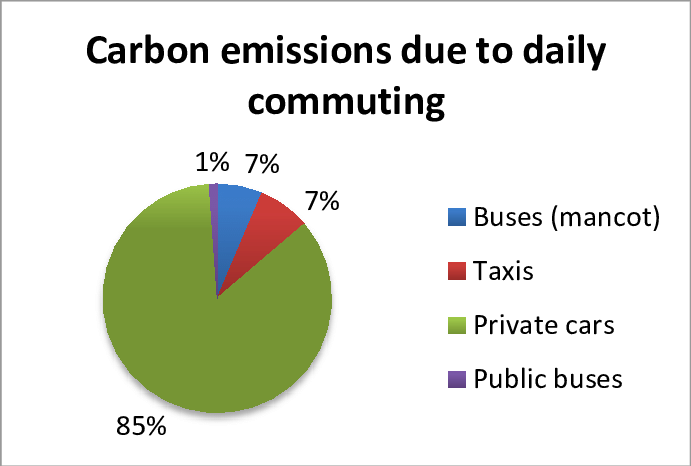How many times have you heard the word “sustainability” in recent years? I bet a lot. But it’s not just a new buzzword everyone dances around. It’s something much more than that.
Sustainability has become an essential part of almost every business strategy. As worldwide concerns about climate change, resource depletion, and environmental degradation increase, businesses tend to change their practices.
Why are businesses of all sizes urged to adopt sustainable business practices? They’re urged because they’ll not only reduce their environmental impact but also remain competitive. It’s also important to stay competitive in a market that increasingly values eco-friendly initiatives.
If you’re new to sustainability practices, let this guide help prepare you. Only then can you jump on this train. It doesn’t matter if you’re a small business or a large corporation. The strategies outlined here will help you become more environmentally conscious and sustainable.
What Are Sustainable Business Practices?
Sustainable business practices refer to the strategies businesses adopt. These strategies help businesses operate in ways that mitigate their negative impacts on the environment, society, or economy. These practices focus on the efficient use of resources. Yet, they promote minimizing waste and foster social responsibility.
The aim is to ensure that business activities meet the present needs. Yet, this has to align with the needs of future generations without compromising their needs.
Sustainable business practices are specific practices that can be implemented in any industry. A good example would be the healthcare industry. Why? It’s simple: Healthcare logistics is a big area where it’s also possible to put in place sustainable practices.
Sometimes, it’s challenging to prioritize the delivery of time-sensitive materials through medical courier services in a way that also prioritizes sustainability. Yet, it is possible. Implementing energy efficiency within warehouses and using electric vehicles for deliveries are only a couple of ways to make a positive impact.
To put it simply, sustainable business practices involve making conscious decisions that balance profitability with long-term sustainability goals. These can include everything from reducing carbon emissions to ethically sourcing raw materials.

Why Should Your Business Adopt Sustainable Practices?
Here are four reasons your business should consider becoming more sustainable.
1. Customer Demand Is Growing
Consumers are more aware than ever of the environmental and social impact of the products they’re purchasing. A study from NielsenIQ found that 70% of global consumers would rather purchase affordable or sustainable products. Customers want to feel good about their purchases. Thus, they are seeking out businesses that align with their values.
When adopted, sustainable business practices will help your company cater to this growing demand. Besides, it’ll help build loyalty among eco-conscious consumers.
2. Improved Brand Reputation
Sustainability can be a powerful branding tool. Companies prioritizing sustainable business practices are often seen as more responsible, ethical, and trustworthy. This will help differentiate your business from competitors. In turn, it’ll make your brand more attractive to a wider audience.
A well-executed sustainability plan will also lead to positive media coverage and industry recognition. All these efforts will further enhance your brand’s reputation.
3. Cost Savings
Adopting sustainability practices can lead to significant cost savings. Energy-efficient lighting, equipment, and processes can lower utility bills. Reducing waste and recycling materials can save on disposal costs. Many governments offer grants or even tax incentives to businesses implementing environmentally friendly practices.
The upfront investment in sustainability often pays off in the long term. Whether it’s through reduced operational costs, waste reductions, or recycling, it’ll save you money and help you elevate further. All this is helpful for becoming a sustainable business that consumers prefer.
4. Attracting and Retaining Talent
Employees, like customers, are increasingly concerned about sustainability. Around 76% of millennials take into account a company’s social and environmental commitments. These considerations are what help them decide where to work. If you venture into sustainable business practices, you will attract top talent who want to work for a company that aligns with their personal values.
Yet, retaining talent is not the same as attracting talent. It goes without saying that when employees feel good about the company they work for, they’ll stay. But businesses must work for that status. Every business that adopts sustainability initiatives often has higher employee engagement, morale, and job satisfaction. All this leads to lower turnover rates.
How to Implement Sustainable Business Practices
Now that you understand the benefits of sustainability, let’s explore actionable strategies to make your business more sustainable.
1. Reduce Energy Consumption
Reducing your energy consumption doesn’t have to mean eliminating fossil fuels completely or adopting a completely new energy source. You can reduce your carbon footprint and energy bills incrementally. Here’s how.
Switch to Renewable Energy
One of the most impactful ways to make your business more sustainable is to transition to renewable energy sources. These sources range from solar and wind to geothermal power. Using these sources is much less harmful to the environment than using fossil fuels. Most importantly, it’ll help reduce your carbon footprint.
Utility companies, along with various governments, offer incentives, rebates, or tax breaks for businesses that install renewable energy systems. Over time, the ROI on your initial investment will be significant. Renewable energy can pay off through lower utility bills and greater energy independence.
The International Renewable Energy Agency (IRENA) says the cost of solar power has dropped a lot in the last decade. The 85% price drop makes renewable energy more affordable than ever. This is why businesses should take this to their advantage and switch to clean energy.

Implement Energy-Efficient Solutions
If transitioning to renewable energy doesn’t work for your business from the start, it’s ok. There are still ways to lower levels of energy consumption, and here are some practical steps to consider:
- Install LED lighting: LED bulbs use significantly less energy than traditional incandescent bulbs. They last longer, thus saving money in the long run.
- Use smart thermostats: These devices can learn your business’s energy usage patterns. Thus, they can adjust heating and cooling settings to save energy.
- Encourage power-down protocols: Train employees to power down computers, monitors, and office equipment when not in use. This will help prevent unnecessary energy waste.
Energy efficiency doesn’t only cut costs. The approach also demonstrates your business’s commitment to sustainability.
2. Cut Waste and Embrace the Circular Economy
Try these simple tactics to reduce your waste and environmental impact.
Reduce Single-Use Plastics
Single-use plastics are among the biggest contributors to pollution. As part of your sustainable business practices, take these steps to reduce or end single-use plastics:
- Offering digital receipts instead of printed paper receipts to cut down on waste.
- Replacing plastic packaging with bio-degradable or recyclable materials.
- Encouraging employees to use reusable water bottles and utensils.
Cut your reliance on single-use plastics to reduce your business’s environmental footprint.
Embrace Recycling and Reuse
Recycling is one of the easiest and most impactful sustainability practices your business can adopt. Ensure that your office or workspace has clearly labeled recycling bins for paper, plastic, and metal.
You can also implement practices that promote the reuse of materials. For example:
- Create a paperless office by using cloud storage, paperless onboarding and digital signatures to reduce paper waste.
- Refurbish old equipment for continued use rather than purchasing new items.
- Donate used office furniture instead of sending it to a landfill.
Recycling and reusing materials is very helpful for the environment. Yet, it helps reduce your operational costs.
3. Source Sustainable Materials
Paying attention to the materials and origins of the products you buy is a small but important way to help our planet heal.
Choose Eco-Friendly Suppliers
It’s important to consider your supply chain to ensure your business is sustainable. Partner with suppliers who focus on sustainability and ethical sourcing. These could include suppliers who use renewable resources, cut waste in their production processes, or provide products made from recycled or organic materials.
Working with eco-conscious suppliers can help ensure that every aspect of your business aligns with your sustainability goals.
Opt for Recycled and Biodegradable Materials
When purchasing supplies, look for products made from recycled or bio-degradable materials. This could include office supplies such as recycled paper, sustainable packaging materials, or even furniture made from reclaimed wood.
Switching to sustainable materials can reduce your business’s impact on the environment. Besides, it’ll help promote a circular economy.
4. Promote Sustainable Transportation
Fossil fuels won’t last forever, so we need to investigate and invest in alternative energy sources for personal and public transportation.

Encourage Green Commuting
Transportation is among the biggest contributors to carbon emissions. You can reduce your company’s transportation-related carbon footprint by encouraging green commuting practices for employees. Some options include:
- Carpooling: Offer incentives for employees who carpool to work.
- Public transportation subsidies: Provide subsidies for employees who use public transit.
- Bike-friendly infrastructure: Install bike racks and provide showers for employees who choose to bike to work.
These strategies will help reduce emissions, but that’s not all. They’ll also promote a healthier lifestyle for your employees. Now, that’s a considerable advantage.
Invest in Electric or Hybrid Vehicles
If your business relies on a fleet of vehicles, consider transitioning to electric or hybrid models. Electric vehicles (EVs) produce less emissions than traditional gas-powered cars. Besides, the cost of EVs is steadily decreasing as technology advances.
Per Bloomberg research, at least 66% of global passenger car sales will be EVs by 2040. EV adoption allows your business to reduce transportation emissions. This is great because it will lead to a massive change toward sustainability.
5. Water Conservation
We can’t survive without clean water, but many of our freshwater sources are heavily polluted. It’s vital that we find ways to not only clean that pollution but also prevent additional waste from contaminating our drinking water.
Implement Water-Efficient Practices
Water conservation is often overlooked. Yet, it’s a crucial aspect of sustainability. Businesses can take several steps to reduce water waste:
- Collecting and using rainwater for landscaping and other non-potable uses.
- Installing low-flow faucets and toilets to lower water consumption.
- Fixing leaks quickly to prevent unnecessary water waste.
Conserving water is very helpful for conserving the environment. Besides, it helps lower your utility bills, which is also important.
6. Foster a Sustainable Workplace Culture
Change requires action, both individual and communal. As the saying goes, it takes a village. The village can be your friend group, neighborhood, family, or workplace. The important thing is that we come together to build a more sustainable culture.
Engage Employees in Sustainability
To put sustainability efforts in place successfully, think about your employees. Your employees must feel motivated and engaged in these efforts. Building a successful sustainability culture among employees can be easy if you follow these strategies:
- Create a “green team”: Form a group of employees who are passionate about sustainability and can lead initiatives within the company.
- Provide sustainability training: Educate employees on why sustainable practices are important and how they can contribute.
- Offer incentives: Reward employees who go above and beyond to support sustainability initiatives.
It’s vital that employees feel involved in your sustainability mission. Only then will they most likely take ownership of the practices and ensure their success.
Create a Green Office Space
Your office environment can also play a key role in promoting sustainability. Make your workspace greener by implementing the following practices:
- Choose energy-efficient equipment: Opt for office appliances and equipment that are certified as energy-efficient.
- Add indoor plants: Plants improve air quality and create a more comfortable, productive workspace.
- Use natural light: Maximizing natural light can reduce your reliance on artificial lighting.
These simple changes can make a big difference. They’ll help in reducing your business’s environmental impact.
7. Measure and Report on Sustainability Progress
You can’t manage what you don’t measure. If we don’t track our progress, we can’t manage the problem.
Track Key Sustainability Metrics
It’s essential to measure the impact of your sustainable business practices. That way, you can identify areas for improvement. Always track key performance indicators (KPIs) such as:
- Waste reduction: Track how much waste is being diverted from landfills through recycling.
- Energy consumption: Track your business’s energy usage and set goals for reducing it.
- Water usage: Measure your company’s water consumption and look for ways to reduce it.
By monitoring these metrics, you’ll ensure your sustainability efforts make a tangible difference.
Share Your Sustainability Achievements
Transparency is vital when it comes to sustainability. Always share your progress with customers, employees, and stakeholders. You can do so by publishing an annual sustainability report. This report should highlight your achievements, challenges, and future goals.
Publicizing your sustainability efforts can enhance your brand reputation. It’ll also build customer trust and show your commitment to making a positive impact. A high NPS for small businesses can further validate these efforts, as it demonstrates that customers are not only satisfied but also loyal to your brand.
Conclusion
Adopting sustainable business practices is great for the environment. Besides, it offers a range of benefits for your business. These benefits range from cost savings and improved brand reputation to attracting eco-conscious customers and employees.
If you were to follow the actionable strategies outlined in this guide, you’d make sustainability a core part of your business operations. Moreover, you’d contribute to a more sustainable future we all strive toward.
About the Author

Guillaume is a digital marketer focusing on content management at Wordable and Digital PR at uSERP. Outside of work, he enjoys his life in sunny Mexico, reading books, wandering around and catching the latest shows on TV.
